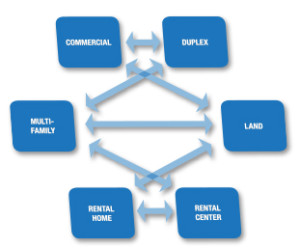As with any U.S. election and exchange of power, a federal tax reform will take place in Washington. The House Republican Blueprint for Tax Reform proposes many changes to the tax code, but thus far, does not repeal nor preserve Section 1031 like-kind exchanges. Therefore, we are in a sort of limbo, not knowing exactly what the future holds for 1031 exchanges.
In June, 2016, House Ways & Means Committee Chairman Kevin Brady (R-TX) and his predecessor, Speaker Paul Ryan (R-WI) announced the “Blueprint for Tax Reform,” an ambitious plan for radical simplification and a complete rewrite of the tax code. The authors believe that the Blueprint will achieve three distinct goals:
1. Create jobs and economic growth
2. Make the tax code simpler, fairer and less burdensome
3. Transform the IRS into a kinder, gentler, taxpayer focused agency
Businesses would be permitted to claim an immediate expense deduction of 100 percent of the cost of newly acquired assets. Unlimited net operating losses could be carried forward indefinitely. The Blueprint is silent as to 1031 exchanges. There is concern that the tax writers may assume that with lowered rates and full expensing, exchanges would be unnecessary.
Our team at Diversified Investment Strategies strongly believes that taking away Section 1031 would have negative impacts on the economy, and that keeping it is extremely beneficial. If investors are faced with reducing the value of their investments through capital gains or recapture tax, even with lower tax rates, they will likely hold onto these properties longer and not utilize the 1031 code for what it was intended for, which is to defer tax and trade for better real estate.
To break this down, here are some of the negative impacts that taking it away could have:
-It would be a disadvantage to farmers and ranchers, and to owners of commercial real estate and all real estate investors.
-It would create a “lock-in” effect in commercial, investment and agricultural property, as investors would not want to sell, due to the increased tax burden.
-Small businesses would be handicapped against larger businesses, who would have more access to capital.
-Fewer environmentally sensitive lands would be saved, as conservation easements would not work for many farmers and ranchers without Section 1031.
-It would have a negative effect on job growth and the U.S. economy as a whole. A study revealed that the repeal of IRC Section 1031 would shrink the economy by 8.1 billion.
Here are some of the many advantages of Section 1031:
-It allows real estate investors to make good business decisions without worrying about negative tax consequences. Property acquired in a 1031 exchange carries approximately 10 percent less debt that property not acquired through a 1031 exchange, according to Realtor Magazine.
-Like-kind exchanges contribute to American jobs, not only in the real estate investment field, but also with jobs for contractors, appraisers, electricians and so on.
-Section 1031 actually increases tax revenue for the country, because although it is used to defer taxes, some federal taxes are paid 34 percent of the time. State and local tax revenue increases as well.
-1031 exchanges increase liquidity of the market, because they motivate sellers to act! A “lock-in” effect is prevented, and properties involved in a like-kind exchange have significantly shorter holding periods.
For more information on all of this, check out this FEA article and this Realtor Magazine article. At DIS, we will continue to keep you updated on this topic!
As of right now, we do not know if Section 1031 will be repealed. However, to be on the safe side, real estate investors may be smart to act now, if wanting to exchange their real estate investment for like-kind property while deferring federal taxes. Don’t delay!
When ready for help with this, our team at Diversified Investment Strategies is standing by, ready to assist you. Contact us today!
This material was prepared and views are those solely of the author and does not necessarily represent the views of the presenting party, nor their affiliates, is for informational purposes only and does not constitute an offer to purchase or sell securitized real estate investments. Forecasts are inherently limited and should not be relied upon as an indicator of future results.
There are risks associated with investing in real estate and Delaware Statutory Trust (DST) properties including, but not limited to, loss of entire investment principal, declining market values, tenant vacancies and illiquidity. Potential cash flows/returns/appreciation are not guaranteed and could be lower than anticipated. Diversification does not guarantee profits or guarantee protection against losses. DST 1031 properties are only available to accredited investors (generally described as having a net worth of over $1 million dollars exclusive of primary residence) and accredited entities only. If you are unsure if you are an accredited investor and/or an accredited entity please verify with your CPA and Attorney. Because investors situations and objectives vary this information is not intended to indicate suitability for any particular investor. This material is not to be interpreted as tax or legal advice. Please speak with your own tax and legal advisors for advice/guidance regarding your particular situation. Securities offered through Concorde Investment Services, LLC (CIS), member FINRA/SIPC. Diversified Investment Services is independent of CIS, both of whom are independent of third-party sites.
Bryan Hakola
Diversified Investment Strategies
Visit Our Website
Learn About Your Investment Options
Become Our Facebook Fan
Follow Us on Twitter
Connect on LinkedIn
